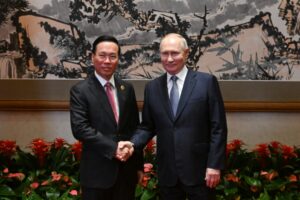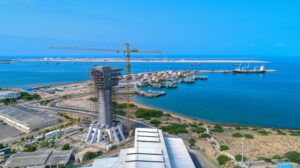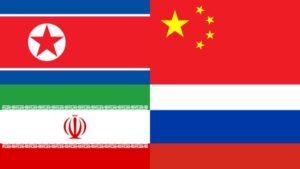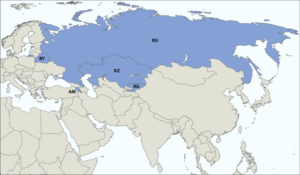A public dispute between the United Arab Emirates (UAE) and Saudi Arabia over oil production quotas is escalating.
This has caused negotiations between the world’s largest oil producing nations to be abandoned and left energy markets lost, pushing oil prices to a six-year high in July 2021.
The 23 nations of OPEC+, which comprises the Organization of Petroleum Exporting Countries cartel and allied producers such as Russia, had to postpone their negotiations indefinitely.

This raised fears about the stability of the group that has been holding production and thus oil supplies in the world since March 2020 to raise its price and thus maintain profitability during the global economic crisis related to the coronavirus.
In early July 2021, the UAE rejected a proposal by OPEC+ leaders Saudi Arabia and Russia to extend production restrictions for another eight months.
The UAE wanted to have more freedom to produce more oil. However, Saudi Arabia and Russia opposed this.
The negotiations took an unusual turn when the energy ministers of the UAE and Saudi Arabia, which are close and united allies against Iran, revealed their differences publicly.
Why doesn’t the UAE want to maintain its current lucrative oil production quota?
According to analysts, the production capacity of Abu Dhabi (capital of the UAE) is out of line with its OPEC quota. The Emirates have invested heavily in recent years to increase their production. And now demand is increasing, they want to take advantage of this to increase revenue and give a return on these investments.
In what other sectors is the rivalry between Saudi Arabia and the United Arab Emirates increasing?
- Economic dispute in the region
- Troops in Yemen
- Relations with Qatar
- Relations with Israel
- Competition in the airline industry
- Relations with Iran
- For several years, the partnership between Saudi Arabia and the United Arab Emirates has shaped the geopolitics of the Arab world.
The personal bond between Saudi Crown Prince Mohammed bin Salman and Abu Dhabi Crown Prince Mohammed bin Zayed has been instrumental in cementing this alliance.
Both men are seen as de facto rulers of their country and have ambitious visions.
For several years, there has been deep cooperation on strategic issues, especially when it comes to Iran, the Persian – not Arab like the two of them – and Shiite majority country, not Sunni like the two of them.
They even formed an Arab military coalition in 2015 to wage war against the Iran-aligned Houthi rebel movement in Yemen and imposed a diplomatic, trade and travel embargo on Qatar in 2017.
But cracks in the relationship began to show two years ago when the UAE withdrew most of its troops from Yemen, leaving the Saudis unhappy.
In January 2021, the Emiratis reluctantly accepted a Saudi-led deal to end the seizure on Qatar, though they remain fearful of relying on Doha. Similarly, Saudi Arabia was not thrilled with the UAE’s decision to normalize relations with Israel last year.
The cracks began to deepen in February this year, when Saudi Arabia issued an ultimatum to multinational companies to relocate their regional headquarters to the Saudi kingdom by 2024 or they will lose their government contracts. This was perceived as an implicit attack on Dubai (in the United Arab Emirates), the commercial hub of the region.
After the Emirates blocked the proposed OPEC+ deal, the Saudis appeared to retaliate by suspending flights to the UAE. He cited concerns about coronavirus variants, but the decision came just before an Islamic holiday, when many people go to Dubai for a break.
Saudi Arabia also announced it would exclude imports from free or Israel-bound zones from a preferential tariff agreement with other Gulf states, dealing a blow to the UAE’s economy, which revolves around a free zone model.
The rivalry between Saudi Arabia and the Emirates is primarily an economic competition
The OPEC+ dispute is underscored by a growing economic rivalry, with both countries trying to diversify their economies by reducing their reliance on hydrocarbon exports.
With Saudi Arabia adopting a more aggressive economic strategy under Mohammed bin Salman, they are now competing in sectors such as tourism, financial services, and technology.
Even Saudi Arabia wants its national airline “Saudia” to start competing on equal terms with Emirates of Dubai, to make Jeddah a major international air hub in the Middle East, just like Dubai, Doha, and Abu Dhabi.
This is because Saudi Arabia has always been the giant of the region, but has always been focused on oil production while Emirates has modernized and become a major commercial and service center right next door. Now it is awakening and on some level this is a concern for the Emirates.
According to experts, in 15 to 20 years, if Saudi Arabia turns into a dynamic economy, that will be a threat to the Emirates’ economic model.
It is still unclear whether Saudi Arabia and the UAE will be able to agree on a new OPEC+ agreement, but this will certainly influence the group’s ability to hold production quotas and therefore increase the price of a barrel of oil.
What about Iran in this rivalry between Saudi Arabia and the United Arab Emirates?
As already reported in this portal, there is at the same time, a timid rapprochement between Saudi Arabia and Iran.
The possible causes of this shift in geopolitical strategy are not yet clear, but possibly have to do with the lack of clear support for the Saudis by the United States in the Biden presidency, and the new Iranian Goreh-Jask pipeline that passes off the Strait of Hormuz and may eventually flood the oil market, thus weakening the OPEC+ agreements.
This increased rivalry with the Emirates may also be a consequence of this rapprochement to Iran by Saudi Arabia.
Whatever the new dynamics of rivalries in the Middle East, the more they stick to the economic and not the military, the better.













[…] the Taliban government can be. However, it is important to put these assessments in perspective. Saudi Arabia, one of the richest and “respected” countries in the world, which is part of the G20, and to […]
[…] In addition, the perspective of natural gas production also places Guyana as a potential alternative supplier to Europe and, by choosing not to join OPEC, the country seeks to protect its national interests and the economic opportunities that arise from positioning itself as a new regional energy power. […]